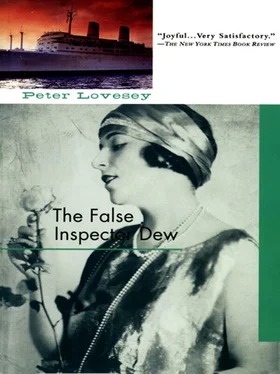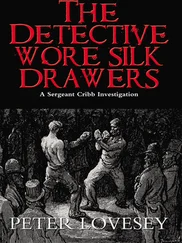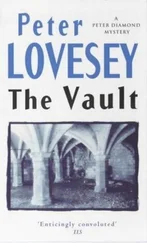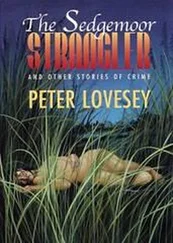Peter Lovesey - The False Inspector Dew
Здесь есть возможность читать онлайн «Peter Lovesey - The False Inspector Dew» весь текст электронной книги совершенно бесплатно (целиком полную версию без сокращений). В некоторых случаях можно слушать аудио, скачать через торрент в формате fb2 и присутствует краткое содержание. Жанр: Классический детектив, на английском языке. Описание произведения, (предисловие) а так же отзывы посетителей доступны на портале библиотеки ЛибКат.
- Название:The False Inspector Dew
- Автор:
- Жанр:
- Год:неизвестен
- ISBN:нет данных
- Рейтинг книги:3 / 5. Голосов: 1
-
Избранное:Добавить в избранное
- Отзывы:
-
Ваша оценка:
- 60
- 1
- 2
- 3
- 4
- 5
The False Inspector Dew: краткое содержание, описание и аннотация
Предлагаем к чтению аннотацию, описание, краткое содержание или предисловие (зависит от того, что написал сам автор книги «The False Inspector Dew»). Если вы не нашли необходимую информацию о книге — напишите в комментариях, мы постараемся отыскать её.
The False Inspector Dew — читать онлайн бесплатно полную книгу (весь текст) целиком
Ниже представлен текст книги, разбитый по страницам. Система сохранения места последней прочитанной страницы, позволяет с удобством читать онлайн бесплатно книгу «The False Inspector Dew», без необходимости каждый раз заново искать на чём Вы остановились. Поставьте закладку, и сможете в любой момент перейти на страницу, на которой закончили чтение.
Интервал:
Закладка:
Peter Lovesey
The False Inspector Dew
FOREWORD
Sixty years have passed and no-one has explained the mystery of the false Inspector Dew.
It was confidently thought that the only scrap of evidence had been destroyed, shredded on the orders of the Commissioner of the Metropolitan Police. But Scotland Yard was unaware of the existence of another file. It was in the Cunard Company archives. It contained the statements of the captain and certain officers of the Mauretania. And it contained the crucial wireless message drafted by the captain and transmitted to the Cunard office at 9.30pm on 9 September, 1921, and telegraphed to Scotland Yard for information.
This reconstruction of the salient events begins the following morning, when the Commissioner picked the message off his desk.
PART ONE
1
SS MAURETANIA. 9 SEPT 1921.
REFERENCE SUSPICIOUS DEATH ON BOARD HAVE INVITED CHIEF INSPECTOR DEW OF SCOTLAND
YARD TO INVESTIGATE.A. H. ROSTRON, CAPTAIN.
Chief Inspector Dew. The Commissioner remembered Dew. He was the man who had pulled in Dr Crippen. That was back in 1910. He was damned sure Dew had quit the force the same year.
He picked up a pencil. Under the message he wrote:
What's this tomfoolery? Comedians are your department.
Smiling to himself, he addressed it to his deputy.
The Deputy Commissioner was at Waterloo that day with Charlie Chaplin. Two hundred constables with arms linked were standing in support. Chaplin had come back to London after nine years in America. He had gone there as a member of the Karno troupe of music hall comedians. He was returning as one of the world's most famous men. Thousands had gathered at the station.
When the train steamed in, the Deputy Commissioner and his senior men raced towards the compartment reserved for Chaplin. They seized him like a prisoner and hustled him along the platform. Beyond the barrier where the crowd was waiting, the blue line stood firm. Chaplin was funneled into a waiting limousine. Few people saw him.
The Deputy Commissioner in a police car drove ahead towards the Ritz Hotel. In Piccadilly it was like Armistice Day again. They took the back way through St James's into Arlington Street.
Chaplin and a cousin sat white-faced in the Lanchester, the doors locked and the windows up. Grinning faces pressed against the glass. The cars inched forward. More police materialised. Chaplin was ordered out. They had reached the Ritz side entrance. He refused to use it. He was home in triumph. As a lowly music hall performer, he had often dreamed of staying at the Ritz. The crowd had come to see him take his place among the rich and famous, the little tramp among the toffs. He announced that he would enter at the front.
The cars edged into Piccadilly. Chaplin got out and stood waving on the running-board. The people surged towards him. The Deputy Commissioner was in despair. By some amazing gift of character or training, Chaplin controlled his public. He made a simple speech. They listened solemnly. They cheered. They let him go inside. But they would not disperse. A double line of traffic stood from Hyde Park Corner to Piccadilly Circus. Chaplin was in the Regal Suite. He had the windows opened. He gathered the carnations from a vase and threw them to the crowd. It was hours before the police could be withdrawn.
Late that night, the Deputy Commissioner came back to Scotland Yard. He had to clear his desk. He was hungry and his feet ached. He went swiftly through his correspondence. He read the wireless message and the Commissioner's droll comment: Comedians are your department. He did not smile.
Walter Dew was vivid in his memory. It was his opinion that Dew was not a great detective, despite his reputation. He had been careless over evidence. He had been far too tender-hearted. He had betrayed a lot of sympathy for the murderer Crippen. He had been lucky to convict him and he knew it. On the day that the appeal was lost, Walter Dew had left the force. He was only in his forties at the time. The Deputy Commissioner had never seen a man so glad to take his pension. Dew had gone to live in Worthing, on the coast. It was strange that he should turn up on an ocean liner, offering to assist with an investigation.
But Dew was an enigma. And at sea, the captain's word was law. It would be interesting to see if Chief Inspector Dew was. equal to his legend.
What could Scotland Yard do now, except take note?
The Deputy Commissioner ticked the message, tossed it in a tray, dismissed it from his mind and went to find a taxi.
Next day a clerk consigned the message to a box-file.
2
The man who would become the false Inspector Dew was called Baranov. His life had been unexceptional until 7 May, 1915, when he was unwittingly involved in one of the notorious incidents of the first world war.
The water off the southern coast of Ireland was dead calm, and a pure, pellucid green. Reflected sunlight shimmered on the huge hull of the Cunard liner Lusitania, steaming towards the port of Queenstown with nearly two thousand passengers and crew and a secret cargo of two hundred and twenty tons of ammunition and sixty-six tons of the explosive pyroxylin. She had been instructed to divert into Queenstown following reports of a German U-boat in the channel ahead.
At 2.10pm the lookout in the crow's-nest saw a clear white track cleaving the water on the starboard side. From its line and speed it could only be the trail of bubbles of compressed air emitted by the driving motor of a torpedo. It was certain to hit the ship. He shouted to the bridge.
Captain William Turner had taken lunch on the bridge as usual. He was a veteran of the days of sail, with no liking for the social life aboard a modern passenger liner. On the previous evening he had steeled himself to join the first class passengers for dinner. After it, in the smoking room, they had staged a veritable inquisition. They had a spokesman called Baranov, a veteran music hall performer who was travelling back to England with his son. Baranov senior had his leg in plaster. His manner was aggressive. He had demanded to be told why the cabin stewards had blacked out the portholes, why the lifeboats had been swung out on their davits and why the officers were stopping passengers from lighting their cigars on deck. Captain Turner had explained that these were routine precautions in a war zone. This had not appeared to reassure Baranov.
The torpedo struck the Lusitania slightly forward of the bridge. A mass of water, smoke and wreckage blocked the captain's view. He shouted to the quartermaster to close all watertight doors that were not already secured. He checked the instruments for evidence of fire or flood below. The ship was listing fifteen degrees.
A second, heavier explosion rocked the Lusitania. It was not another torpedo. It was the secret cargo destroying her from within. Captain Turner gave the order to lower the boats, and then was horrified to feel a coolness on his face through the smoke and dust. Incredibly, the ship was still under way. So long as she was moving, the lifeboats could not be safely lowered.
Third Engineer George Little heard the captain order full speed astern to halt the onward movement of the ship. He felt sick with fear. The last inspection of the valves in the low pressure turbine had revealed a defect. The captain had been warned that full speed astern could cause a dangerous feedback of steam. Little had no choice. He obeyed the order. There was an immediate blowback, fracturing a main steam pipe. Stunned and frightened, Little reacted by throwing the engine room controls back to full steam ahead. The blowback had reduced the head of steam, but the Lusitania still made way steadily.
Читать дальшеИнтервал:
Закладка:
Похожие книги на «The False Inspector Dew»
Представляем Вашему вниманию похожие книги на «The False Inspector Dew» списком для выбора. Мы отобрали схожую по названию и смыслу литературу в надежде предоставить читателям больше вариантов отыскать новые, интересные, ещё непрочитанные произведения.
Обсуждение, отзывы о книге «The False Inspector Dew» и просто собственные мнения читателей. Оставьте ваши комментарии, напишите, что Вы думаете о произведении, его смысле или главных героях. Укажите что конкретно понравилось, а что нет, и почему Вы так считаете.












